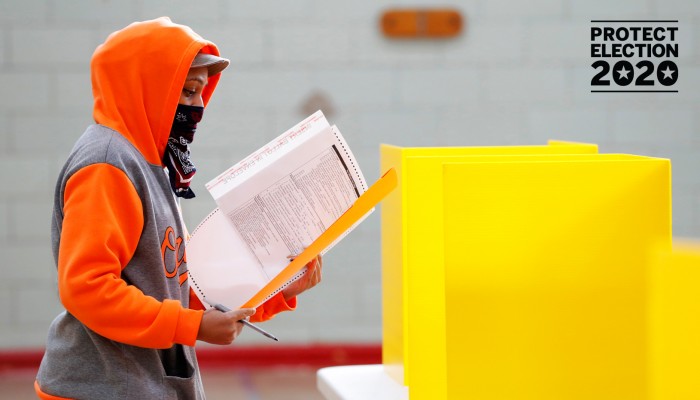The coronavirus pandemic has changed voting behavior and poses an extraordinary challenge to state and local officials as they seek to ensure that elections in 2020 are fair, safe, and secure. As national policymakers consider how people should vote in light of the pandemic, elections themselves have already changed. Millions of voters are requesting mail ballots, far more than would have been the case otherwise. Many fewer are updating their registrations at government offices. Instead, they register online or find other ways to sign up. Governments face the unforeseen cost of investing in personal protective equipment (PPE) and sanitation supplies to reduce the risk of illness and even death to their workers and voters. 1 Even if no rules change, the 2020 election will be costly.
Congress has already provided some help. On March 27, President Trump signed into law a $2 trillion economic relief package that included $400 million in grants to help states run their elections during the coronavirus disease 2019 (Covid-19) pandemic. This was an important first step. Unfortunately, we now know this is not enough. 2
In this document we examine the difference between the March 27 federal investment in the electoral process and what will be needed to ensure safe and healthy elections for 2020. We focus on Georgia, Michigan, Missouri, Ohio, and Pennsylvania. These five states have diverging election administration systems and needs, from the number of elections each will hold this cycle to their requirements for absentee voting. Two common themes stand out.
First, what Congress has provided so far is not enough to run safe and secure elections in 2020. Our review shows that the March 27 grants will likely cover anywhere from less than 10 percent of what Georgia officials need to around 18 percent of what Ohio officials need.
Second, local election jurisdictions bear the heaviest burden of protecting voters and workers during the election. In two of the states we examined, local governments must cover over 90 percent of the costs needed to ensure safe and secure elections this year. In all five states, they will bear the overwhelming share of such expenses.
The measures that we appraise in this document are critical. They come from our discussions with numerous election officials in each of the five states we examined. States need help:
- developing the infrastructure necessary to support changed voter behavior (e.g., more voters choosing to register online or to vote by mail);
- protecting voters and election workers during elections (e.g., giving poll workers PPE, allowing curbside voting, cleaning polling places, and ensuring that election staff can work off-site as needed without exposing election offices to cyberattacks); and
- educating the public about changes made to election procedures and polling locations (including notice of changed elections, moved polling sites, and new voting options to reduce density at in-person locations).
The accompanying report represents the consensus of an ideologically diverse group of organizations: the Alliance for Securing Democracy, the Brennan Center for Justice, Pitt Cyber, and R Street Institute. From interviews with election officials and the vendors who must supply most of the products and services these officials need, it is clear that additional appropriations are necessary to fulfill the goal of free, fair, and safe elections in 2020. Without funding from the federal government, there is little chance that state and local governments can shoulder the financial burden. Indeed, nearly every state and local government in the country faces severe budget challenges this year. 3
Without congressional leadership, the risk of repeating the problems experienced in recent primaries will increase dramatically. These problems include an inability to timely process ballot applications, closed polling places, and unnecessary sickness and even death for voters and election workers performing their civic duties. 4 Facing an economic downturn, states may soon tighten their belts further on many services. The federal government has the resources to ensure that state and local governments can run free, fair, and safe elections this fall. We urge them to do so as soon as possible.
Endnotes
-
1
There have been several instances of poll workers testing positive for Covid-19 soon after elections. See e.g., John Keilman, “After Chicago poll worker dies from COVID-19 and others test positive, city warns voters they might have been exposed to virus at polling places,” Chicago Tribute, Apr. 13, https://www.chicagotribune.com/coronavirus/ct-chicago-poll-worker-dies-covid-cornavirus-20200413-rz55vqpo6jfbxn7e4i6vkj6n2y-story.html; Gary Fineout, “2 Florida primary poll workers test positive for coronavirus,” Politico, Mar. 26, 2020, https://www.politico.com/states/florida/story/2020/03/26/2-florida-primary-poll-workers-test-positive-for-coronavirus-1269261. -
2
Moreover, some states are concerned that they will not be able to access the federal funds because of constraints put on the money. National Association of Secretaries of State, “NASS President Paul Pate & President-elect Maggie Toulouse Oliver Open Letter to Congress and American Voters on COVID-19 Election Preparations,” Mar. 25, 2020, https://www.nass.org/node/1824. -
3
Stateline Article, “ ‘We Have No Money’: Coronavirus Slams State Taxes,” Pew Charitable Trusts, Apr. 2, 2020, https://www.pewtrusts.org/en/research-and-analysis/blogs/stateline/2020/04/02/we-have-no-money-coronavirus-slams-state-taxes (“Few state economists and budget analysts have calculated the fiscal impact of the pandemic so far, and it’s hard at this early stage to say how big the drop off in tax collections will be, said Brian Sigritz, director of state fiscal studies for the National Association of State Budget Officers, a Washington, D.C.-based membership organization. But the early estimates don’t look good, he said. ‘It looks like the drop-off that states could be facing this time could be more severe than the Great Recession.’”). -
4
See, e.g., Keilman, “After Chicago poll worker dies from COVID-19 and others test positive, city warns voters they might have been exposed to virus at polling places”; Fineout, “2 Florida primary poll workers test positive for coronavirus.”


